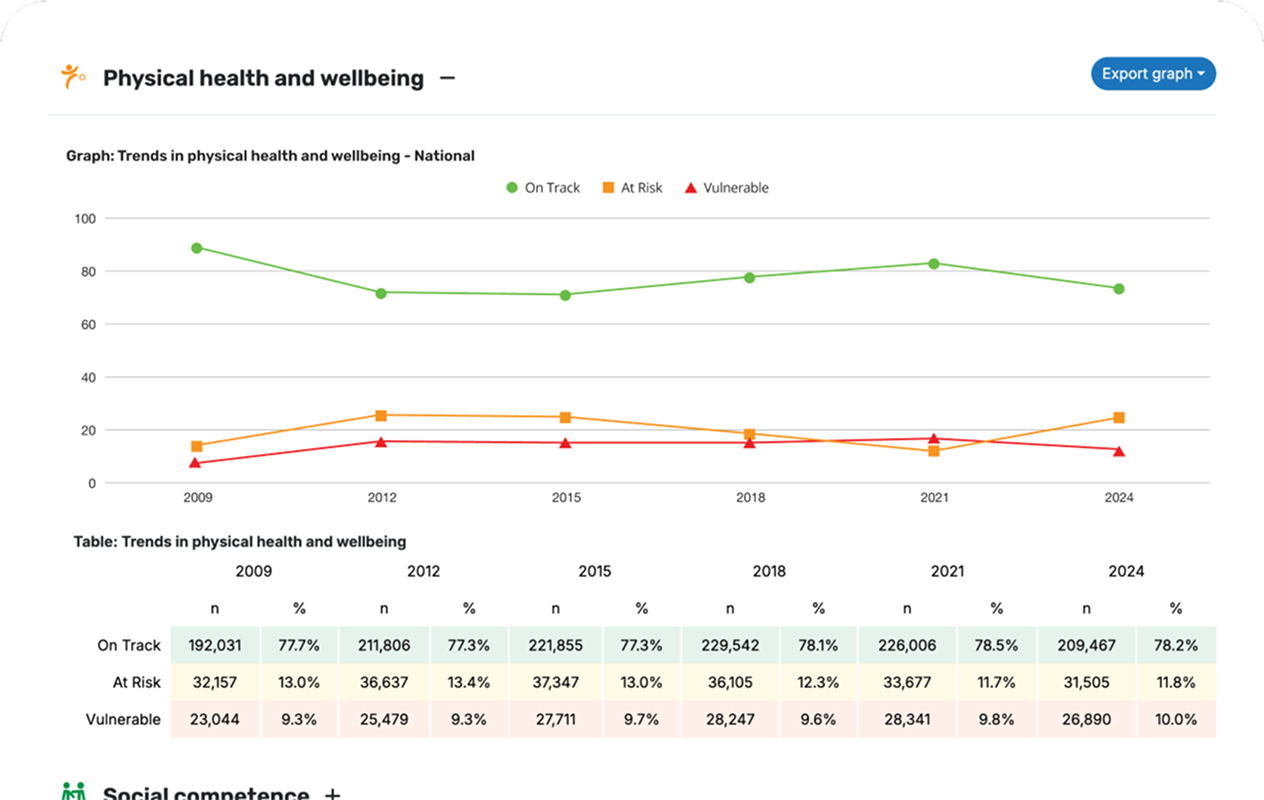Macrodata and microdata
Approval to access data is contingent on it being for appropriate use and consistent with the principles outlined in the Data Guidelines.
Application processes may vary depending on the type of data being sought and its use. The Data Management Agency (DMA) will work closely with applicants throughout the process to ensure the data meets their needs.
The Data Application Assessment Guidelines detail the assessment criteria used by the DMA to authorise the supply of AEDC data.
Organisations seeking microdata for multiple research projects may need to consider a Data Sharing Agreement with the Australian Government.

Macrodata
Summary data or macrodata contain aggregated information. AEDC macrodata is available in a range of formats such as tables, reports or profiles and typically aggregated by geography, AEDC Cycle, and demographic characteristics. Non-government agencies and individual data applicants may request unreleased macrodata through a macrodata application form. Government agencies may request unreleased macrodata through a dedicated form.
Microdata
Microdata is unit record data that contains deidentified and confidential information about individual children. While no personal information is released, some records will be unique to individuals. To ensure confidentiality, strict legal and regulatory controls are followed to manage the use of microdata. Microdata applications are recommended when data is needed for a specific project where a predefined selection of AEDC variables is used to answer one or more specified research questions. Applicants may request deidentified microdata from the DMA through a microdata application form.
.jpg?sfvrsn=5bf6e1a4_1)
Data integration projects
Data integration is the process of combining information from different sources to provide new datasets for statistical, research or policy purposes. Data linkage is the process of identifying information about the same individual or analytical unit across datasets to integrate them.
AEDC data linkage can only be undertaken by authorised data linkage agencies.
Deidentified AEDC microdata can be requested for inclusion in data integration projects from:
- the DMA by completing the dedicated section in the Microdata Application Form
- Data users must also submit an application to the authorised data linkage agency that will conduct the linkage
- via a permanent data linkage repository such as Person Level Integrated Data Asset (PLIDA).
Data integration projects including AEDC data are subject to these Commonwealth arrangements.
Bespoke data linkage projects
Identified AEDC microdata are securely held by the DMA and are exclusively disclosed for data linkage purposes to authorised data linkage agencies. These include Approved Data Linkage Units (DLU)s, Commonwealth accredited integrated authorities, and AEDC Integrating Authorities (agencies that have been approved to undertake linkage using AEDC data for internal purposes).
Data applicants are responsible for nominating a data linkage agency and are required to check whether the selected data linkage agency can undertake the linkage required for the proposed study, as well as for obtaining approval from the custodians of all datasets to be linked to AEDC data. For a list of data linkage agencies that have been approved to undertake data linkage projects including AEDC data, see below.
- Australian Bureau of Statistics (ABS)
- Australian Institute of Health and Welfare (AIHW)
- The Australian Institute of Family Studies (AIFS)
- The South Australian and Northern Territory DataLink (SA NT DataLink)
- The Centre for Health Records Linkage (CHeReL)
- Department of Health Western Australia
- The Tasmanian Data Linkage Unit (TDLU)
- The Centre for Victorian Data Linkage (CVDL)
- Data Linkage Queensland (DLQ), Queensland Department of Health.
Data linkage repositories
The Person-Level Integrated Data Asset (PLIDA) is a secure data asset managed by the Australian Bureau of Statistics (ABS). PLIDA consists of a number of administrative and research datasets which ABS are responsible for linking and providing selective access to authorised researchers for approved projects. Data applicants wishing to access integrated AEDC data through PLIDA should follow the data application protocols available on the ABS website.
PLIDA data applications are forwarded by the ABS to the Australian Government Department of Education (the Department) for approval. Materials including unreleased AEDC data from PLIDA are subject to the publication rules outlined in the AEDC Data Guidelines. Researchers interested in using linked AEDC data are encouraged to explore the PLIDA metadata to understand whether it may be suitable for their project requirements.
Community Data Explorer
Navigate the AEDC Community Data Explorer and understand the data.
